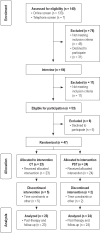A randomized controlled trial of problem-solving therapy compared to cognitive therapy for the treatment of insomnia in adults
- PMID: 23633757
- PMCID: PMC3624829
- DOI: 10.5665/sleep.2640
A randomized controlled trial of problem-solving therapy compared to cognitive therapy for the treatment of insomnia in adults
Abstract
Study objectives: To compare the efficacy of problem-solving therapy (PST) combined with behavioral sleep strategies to standard cognitive therapy (CT) combined with behavioral sleep strategies in the treatment of insomnia.
Design: A six-week randomized controlled trial with one month follow-up.
Setting: The Australian National University Psychology Clinic, Canberra, Australia.
Participants: Forty-seven adults aged 18-60 years recruited from the community meeting the Research Diagnostic Criteria for insomnia.
Interventions: Participants received 6 weeks of treatment including one group session (sleep education and hygiene, stimulus control instructions and progressive muscle relaxation) followed by 5 weeks of individual treatment of PST or CT.
Measurements and results: Primary outcomes included sleep efficiency (SE) from sleep diaries, the Insomnia Severity Index (ISI), and the Pittsburgh Sleep Quality Index (PSQI). Secondary measures assessed dysfunctional sleep beliefs, problem-solving skills and orientations, and worry. Both treatments produced significant post therapy improvements in sleep which were maintained at 1 month follow-up (on SE Cohen d = 1.42, 95% CI 1.02-1.87 for PST; d = 1.26, 95% CI 0.81-1.65 for CT; on ISI d = 1.46, 95% CI 1.03-1.88 for PST; d = 1.95, 95% CI 0.52-2.38 for CT; for PSQI d = 0.97, 95% CI 0.55-1.40 for PST and d = 1.34, 95% CI 0.90-1.79 for the CT). There were no differences in PST and CT in the size or rate of improvement in sleep although CT produced a significant faster rate of decline in negative beliefs about sleep than PST and there was a trend (P = 0.08) for PST to produce a faster rate of improvement in negative problem orientation than CT.
Conclusions: The results provide preliminary support for problem solving treatment as an equally efficacious alternative component to cognitive therapy in psychological interventions for insomnia.
Keywords: Insomnia; cognitive behavior therapy; cognitive therapy; non-pharmacological treatment; problem-solving therapy.
Figures
Similar articles
-
Effects of a Tailored Brief Behavioral Therapy Application on Insomnia Severity and Social Disabilities Among Workers With Insomnia in Japan: A Randomized Clinical Trial.JAMA Netw Open. 2020 Apr 1;3(4):e202775. doi: 10.1001/jamanetworkopen.2020.2775. JAMA Netw Open. 2020. PMID: 32286659 Free PMC article. Clinical Trial.
-
Cognitive Behavioral Therapy for Insomnia in Older Veterans Using Nonclinician Sleep Coaches: Randomized Controlled Trial.J Am Geriatr Soc. 2016 Sep;64(9):1830-8. doi: 10.1111/jgs.14304. Epub 2016 Aug 22. J Am Geriatr Soc. 2016. PMID: 27550552 Free PMC article. Clinical Trial.
-
Randomized controlled trial of telephone-delivered cognitive behavioral therapy for chronic insomnia.Sleep. 2013 Mar 1;36(3):353-62. doi: 10.5665/sleep.2448. Sleep. 2013. PMID: 23450712 Free PMC article. Clinical Trial.
-
Psychological treatment for insomnia in the regulation of long-term hypnotic drug use.Health Technol Assess. 2004 Feb;8(8):iii-iv, 1-68. doi: 10.3310/hta8080. Health Technol Assess. 2004. PMID: 14960254 Review.
-
Mechanisms of cognitive behavioural therapy for insomnia.J Sleep Res. 2023 Dec;32(6):e13860. doi: 10.1111/jsr.13860. Epub 2023 Mar 2. J Sleep Res. 2023. PMID: 36866434 Review.
Cited by
-
Reliability and validity of the Spanish version of the Pittsburgh Sleep Quality Index (PSQI) in patients with fibromyalgia.Rheumatol Int. 2014 Jul;34(7):929-36. doi: 10.1007/s00296-014-2960-z. Epub 2014 Feb 8. Rheumatol Int. 2014. PMID: 24509897
-
Presleep thoughts and dysfunctional beliefs in subjects of insomnia with or without depression: Implications for cognitive behavior therapy for insomnia in Indian context.Indian J Psychiatry. 2016 Jan-Mar;58(1):77-82. doi: 10.4103/0019-5545.174385. Indian J Psychiatry. 2016. PMID: 26985109 Free PMC article.
-
Change in quality of life after brief behavioral therapy for insomnia in concurrent depression: analysis of the effects of a randomized controlled trial.J Clin Sleep Med. 2014 Apr 15;10(4):433-9. doi: 10.5664/jcsm.3624. J Clin Sleep Med. 2014. PMID: 24733990 Free PMC article. Clinical Trial.
-
Psychometric properties of the 52-, 25-, and 10-item English and Spanish versions of the Social Problem-Solving Inventory-Revised.Front Psychol. 2023 Sep 21;14:1213784. doi: 10.3389/fpsyg.2023.1213784. eCollection 2023. Front Psychol. 2023. PMID: 37809313 Free PMC article.
-
Effect of exercise and cognitive activity on self-reported sleep quality in community-dwelling older adults with cognitive complaints: a randomized controlled trial.J Am Geriatr Soc. 2014 Dec;62(12):2319-26. doi: 10.1111/jgs.13158. J Am Geriatr Soc. 2014. PMID: 25516028 Free PMC article. Clinical Trial.
References
-
- Morgenthaler T, Kramer M, Alessi C, et al. Practice parameters for the psychological and behavioral treatment of insomnia: an update. An American Academy of Sleep Medicine Report. Sleep. 2006;29:1415–9. - PubMed
-
- Morin CM, Bootzin RR, Buysse DJ, Edinger JD, Espie CA, Lichstein KL. Psychological and behavioral treatment of insomnia: update of the recent evidence (1998-2004) Sleep. 2006;29:1398–414. - PubMed
-
- Morin CM, Hauri PJ, Espie CA, Spielman AJ, Buysse DJ, Bootzin RR. Nonpharmacologic treatment of chronic insomnia: An American Academy of Sleep Medicine review. Sleep. 1999;22:1134–56. - PubMed
Publication types
MeSH terms
LinkOut - more resources
Full Text Sources
Other Literature Sources
Medical



